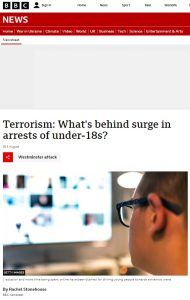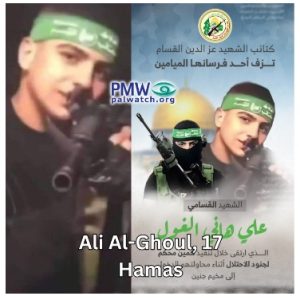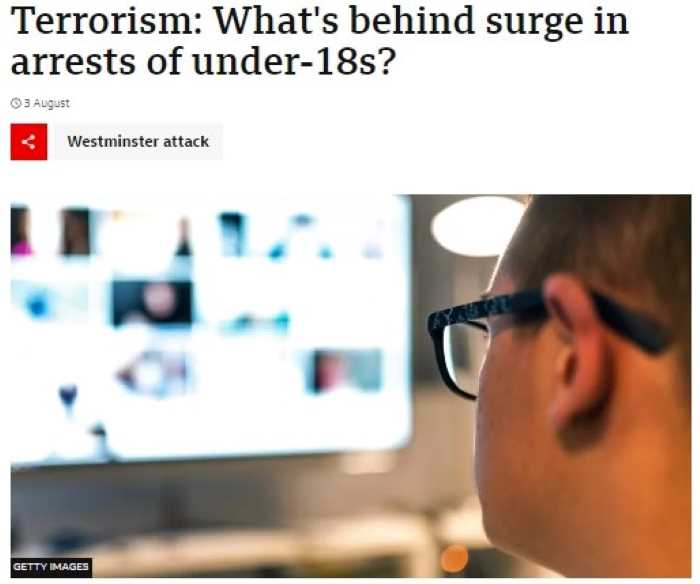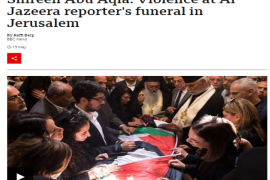On August 3rd a report appeared in the ‘Newsbeat’ section of the BBC News website (aimed at younger audiences) under the headline ‘Terrorism: What’s behind surge in arrests of under-18s?’.
Written by Rachel Stonehouse, tagged ‘counter-terrorism’ and relating to the UK, the report tells readers that:
“Record numbers of young people are being arrested for terrorism-related offences. And their journey into extremism tends to start online. […]
Figures from UK Counter Terrorism Policing (CTP) show that one in five of those arrested for terrorism-related offences are under 18.
In 2019, just 4% of those arrested were aged under 18 – but by 2022 the figure had increased to 20%.
Matt Jukes, the head of CTP, says it’s a “really worrying trend”.
“These extreme ideologies are much more available online and on social media than they ever were before,” he says.
“And we know young people are exploring dark corners of the web.””
The report goes on:
“CTP chief Matt says the pandemic has fuelled the increase in young people involved in terrorist offending, and that social isolation and time spent online is a contributing factor.”
Among the additional articles offered as ‘related reading’ is one dating from January 2023 and headlined ‘Terrorism: Police concern over teen far-right extremism’. Another, dating from December 2021 is titled ‘Record number of children in UK held over terror crimes’. In the first of those reports (both of which are also tagged ‘counter-terrorism’) readers learn that in the UK, ‘terror crimes’ include internet activities.
‘”In terms of the ages, we’ve seen the low teens – and that is an incredibly alarming thing to see,” Det Supt Rees said.
“We have seen people engaged in attack plots, attack planning, looking at attacking locations or individuals.
“But we’ve also seen significant volumes of offences related to sharing, downloading and sending material, which breaches the terrorism act.’
Among the cases highlighted in that report are the following:
“Benincasa was sentenced to nine years and three months in prison at Winchester Crown Court in Hampshire on Wednesday for being a “prominent” member of the banned neo-Nazi group Feuerkrieg Division. […]
A Nazi dagger and documents on how to make explosives and poisons were found by police at his home.
In 2021, a 16-year-old boy from Cornwall was sentenced after leading the British arm of Feuerkrieg Division.
He downloaded his first bomb-making manual when he was 13, making him one of the UK’s youngest terror offenders.”
The BBC’s approach to reporting on “terrorist offending” under-18s in the UK is particularly interesting when compared to its coverage of Palestinian minors engaged in rather more than searching out and sharing problematic material on the internet.
Last month a seventeen-year-old member of Hamas from Jenin who actually made bombs (rather than downloading a manual from “dark corners of the web”) was killed:
“Seventeen-year-old Ali al-Ghoul was shot while attacking an IDF bulldozer with a pipe bomb. The Jenin Battalion later put out a video showing al Ghoul and other minors making IEDs.”
The BBC’s coverage did not however include the words ‘terror’ or ‘terrorism’:
“The Palestinian health ministry said nine Palestinians had been killed by Israeli forces, including three in the overnight drone strike. They all appeared to be young men or in their late teens – some confirmed as belonging to armed groups.”
Moreover, the corporation (again) later chose to amplify a third party’s talking points concerning “children”:
“At a news conference in Geneva on Tuesday, a spokeswoman for the UN’s humanitarian office said it was “alarmed at the scale of air and ground operations that are taking place in Jenin and continuing today in the West Bank, and especially [the] air strikes hitting a densely populated refugee camp”.
She said the Palestinian health ministry had confirmed that three children – two 17-year-old boys and a 16-year-old boy – were among those killed, and warned that damage to infrastructure meant most of the camp now had no drinking water or electricity.”
As documented here, all three of those “children” were claimed by terrorist organisations.
As we see, the BBC’s editorial guidelines do not prevent it from using language such as terrorism, terrorist or terror when covering extremism among under-18s in the UK. However, such terminology is scrupulously avoided when the corporation reports on Palestinian minors recruited by designated terrorist organisations and actively engaged in terrorism.
Related Articles:
ANOTHER REMINDER OF THE BBC’S INCONSISTENCY ON TERRORISM
BBC NEWS PALESTINIAN SUMMER CAMP SILENCE PERSISTS
BBC NEWS APOLOGISES FOR ‘THE ISRAELI FORCES ARE HAPPY TO KILL CHILDREN’ CLAIM
BBC’S TOM BATEMAN PROMOTES THE NARRATIVE OF DESIGNATED NGOS
LOOKING BEHIND BBC REPORTING ON THE DEATHS OF PALESTINIAN TEENS
BBC NEWS CONTINUES TO AVOID THE TOPIC OF PALESTINIAN CHILD SOLDIERS






The Middle East editor makes all journalists swallow the ‘Palestinian cannot be terrorists pill’ even when they have been filmed committing acts of terrorism. But when a corporation in an English Christian country employs a Muslim head of religious reporting as they have done for many years, how can there not be bias and distortion of the truth.? Indoctrination of the masses into accepting the Islamic culture is the goal and the BBC are number one in promoting its ideology . The Quran permits lies and deception provided it it is done to further the ideology of Islam. #defundthebbc